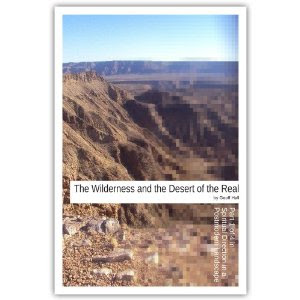
i spoke about a wonderful little book written by my friend Geoff Hall in a previous post.
well here's a short review:
Geoff explains and contrasts two desert experiences: the first being the "Wilderness" a Personal testing Ground which we are called into by God; the second 'The Desert of the Real" which he describes as the Postmodern landscape characterized by nihilism, non-existance and non-redemption.
Geoff has written this book in particularly for artists though it could be helpful reading for all who are trying to live out a God inspired life in Postmodern times.
The artist needs to traverse the Wilderness in order to 'embody the presence of God', to hear his 'still small voice' , to know deep down that she is loved...
from this experience flows her creativity...she's perceived the invisible wind and seeks to reveal it through her art.
The artist is encouraged not to mimick the mayhem of Postmodern philosophy but to bring to our culture hope, love and redemption.
Geoff also highlights the problematic of doing 'theology' through the arts:
"The artist wants to get to the marketplace to participate in the conversation. The theologian wants to control the conversation. The artist wants a free-forming discourse on the plastic horizon. The theologian wants to measure the distance to the horizon and makes sure nobody gets beyond it...Artistic language is aesthetic - not theological - for once theological language is applied to the creation of art you end up with tired symbolism; the art of ecclesiastical propaganda!"
This book is a gem for those serious about taking meaningful art to our Postmodern society.
Hi Mark, thanks for this post. It's one of the few articles that I've read about art and the Christian artist.
RépondreSupprimerJust want to throw a question up in the air about this quote by Geoff Hall:
'The theologian wants to measure the distance to the horizon and makes sure nobody gets beyond it'
The theologian. I would hope that is not what the role of the theologian is. As we find in Isaiah, God's ways & thoughts are higher than our ways & thoughts. To 'make sure nobody gets beyond' the horizon implies a theologian reduces God to a formula or simple-god rather than acknowledging with humility that we can only know what God reveals. Inevitably, after years of studying the Bible and life experience, we still cannot say we 'get' God.
So rather than putting a negative slant on the role of a theologian, albeit there are theologians out there who do their job poorly, how about asking the question how can the theologian and the artist work well together, if that makes sense?
Hi Mrbonchapeau,
RépondreSupprimerI think if we simply put on a positive gloss (slant), then we suggest that all is right with the world. That is far from being so. We have plenty of experience which shows a lack of humility by the theologian, who like the religious scholars of Jesus' day don't enter the kingdom and won't let others enter either.
We cannot put our heads in the sand and pretend there is no problem. The artist has to be free from theological control to be an artist, to realise their calling.
And you are right, we don't just 'get' God, only probably the god of our creation, who simply confirms what we believe!
Thanks for your comments,
Geoff
Hi Mark C,
RépondreSupprimerhope that the comment from Geoff helped you understand his quote.
It's much more beneficial to receive the reflection from the author.
I think that there is a danger that theologians simply put God in a box - by their systematic manner of 'studying' Him.
The problematic for the artist is to remain honest to her 'calling' as a child of God; and her 'calling' as artist; and not to simply use art as a means of christian propaganda (or evangelism - i'm beginning to detest this word).
I think that the artist who has experienced and has been touched by the divine, that something of this experience will be seen or sensed in her work.
The artist has 'seen'/' imagined' a better world and through her art will reveal glimpses of that better place and maybe contrast it with the
one in which we live.